Configuring JMS Clients
The following topic provides instructions on how to configure JMS Clients in Repository-based projects within the Sun JavaTM Composite Application Platform Suite (Java CAPS). Java CAPS. Additional information is given in the Java CAPS JMS Reference . If you have any questions or problems, see the Java CAPS web site at http://goldstar.stc.com/support.
Additional details on the configuration. process are provided in the following sections:
Configuring JMS Clients
JMS clients are of two basic types: producers and consumers (or a combination of both). If associated with a queue, these become queue senders and receivers, respectively. If associated with a topic, they become topic publishers and subscribers, respectively. The configuration parameters vary according to the type of JMS Client.
Note –
To reconfigure an existing JMS client, redeploy the Deployment Profile.
Figure 1 JMS Client Types
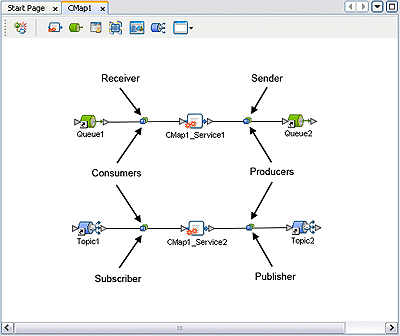
 To Configure a JMS Client
To Configure a JMS Client
-
Double-click on the client icon to display the appropriate configuration dialog.
-
Click in the value field for each property to open the field for editing. If no menu appears, then you can enter free text.
-
Click OK to save your selections.
Root Properties
Properties appear in the root dialog only if the client is a topic subscriber.
Double-clicking the JMS client icon displays the following dialog.
Figure 2 JMS Client Configuration Properties Dialog (Subscriber)
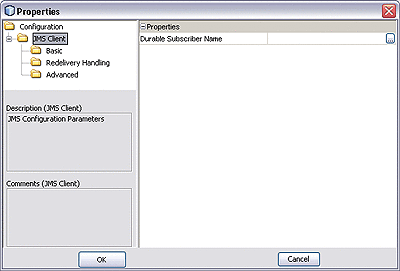 Table 1 JMS Client Configuration Properties
Table 1 JMS Client Configuration Properties|
Property |
Applies to |
Description |
|---|---|---|
|
Durable Subscriber Name |
Topic subscribers only |
Specifies the durable subscriber name. |
Note –
Once set, the Durable Subscriber Name does not get autogenerated, and can only be changed manually. Copies of the Connectivity Map will also retain this name.
Basic Properties
Which properties appear in the dialog depends upon whether the client is a producer or consumer.
Figure 3 JMS Client Basic Configuration Properties Dialog (Producer)
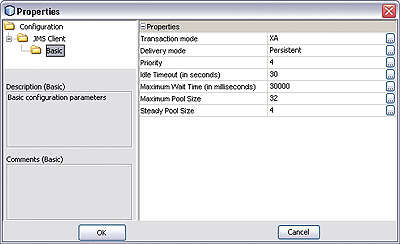
Figure 4 JMS Client Basic Configuration Properties Dialog (Consumer)
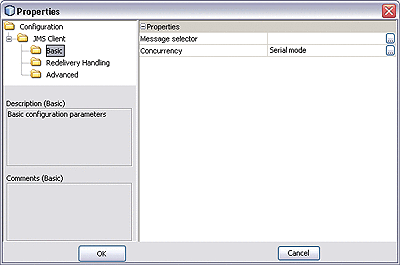 Table 2 JMS Client Basic Configuration
Properties
Table 2 JMS Client Basic Configuration
Properties|
Property |
Applies to |
Description |
|---|---|---|
|
Transaction mode |
All producers |
Specifies whether messages for this session use Transacted or XA mode. For consumers, the default is always XA; otherwise, the default is Transacted. |
|
Delivery mode |
All producers |
Specifies whether the messages for this JMS connection are persistent or non-persistent. The default is Persistent. |
|
Priority |
All producers |
Specifies the message priority. Allowed values are 0 - 9; the default is 4. |
|
Idle timeout |
All producers |
Specifies the number of seconds to wait before returning a connection to the pool. The default is 30 seconds. |
|
Maximum Pool Size |
All producers |
Specifies the maximum number of connections to be made to the message server. The default is 32. |
|
Maximum Wait Time |
All producers |
Specifies the maximum amount of milliseconds to wait for acquiring a connection before throwing an exception. The default is 30000 milliseconds. |
|
Steady Pool Size |
All producers |
Specifies the minimum and initial number of connections maintained in the pool. The default is 4. |
|
Message selector |
All consumers |
Specifies a message selector. |
|
Concurrency |
All consumers |
Specifies whether the message consumers uses connection consumer or serialized processing. The default is Serial mode. |
Redelivery Handling Properties
Redelivery has to do with the way messages are re-delivered after previous attempts at delivery have failed. You can override the default behavior of the message redelivery process by configuring your own custom characteristics for the JMS client. Additional details are given in the Java CAPS JMS Reference , including an alternate method of configuring redelivery.
Figure 5 JMS Client Redelivery Handling Properties Dialog (Consumer)
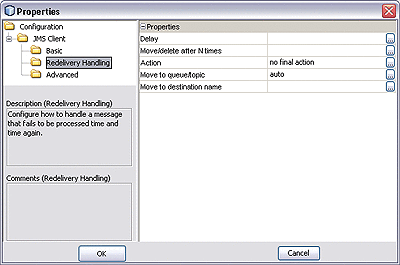 Table 3 JMS Client Redelivery Handling
Configuration Properties
Table 3 JMS Client Redelivery Handling
Configuration Properties|
Property |
Applies to |
Description |
|---|---|---|
|
Delay |
All consumers |
Specifies the delay(s) to apply following a number of retries. The format is <retries:delay>, where the number of retries is counted from the original rollback and the delay time is in milliseconds. The maximum allowed delay is five seconds (5000 ms). Progressive delays can be specified by concatenating retry:delay pairs separated by a comma and a space. |
|
Move/Delete after N times |
All consumers |
Specifies the number of retries to allow before moving (redirecting) or deleting the message. The number of retries is counted from the original rollback. |
|
Action |
All consumers |
Specifies whether to move (redirect) or delete the message after the number of retries specified by the previous property. The default is no final action, which specifies continued retries until received. |
|
Move to queue/topic |
All consumers |
Specifies whether to redirect to a queue or a topic, when move is selected as an action. The default is auto, which specifies redirection to a destination of the same type as the producer. |
|
Move to destination name |
All consumers |
Specifies a name for the destination to which the message is to be redirected. The special character <$> specifies the original destination name. |
Advanced Properties
Which properties appear in the dialog depends upon whether the destination is a topic or queue.
Figure 6 JMS Client Advanced Configuration Properties Dialog (Subscriber)
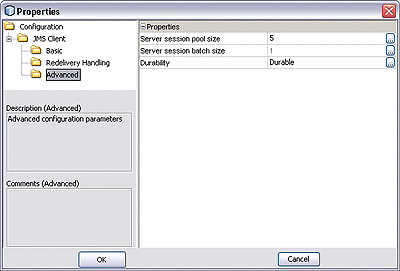 Table 4 JMS Client Advanced Configuration
Properties
Table 4 JMS Client Advanced Configuration
Properties|
Property |
Applies to |
Description |
|---|---|---|
|
Server session pool size |
All consumers |
Specifies the maximum number of threads per ServerSessionPool to be used for concurrent processing. The allowed values are 1 - 100. The default is 5. |
|
Server session batch size |
All consumers |
Specifies the maximum number of messages that a connection consumer can load into a server session at one time. The default value is 1, and cannot be changed. |
|
Durability |
Topic subscribers only |
Specifies whether or not the subscriber to this JMS client connection is durable. The default is Durable. |
- © 2010, Oracle Corporation and/or its affiliates
